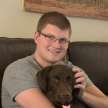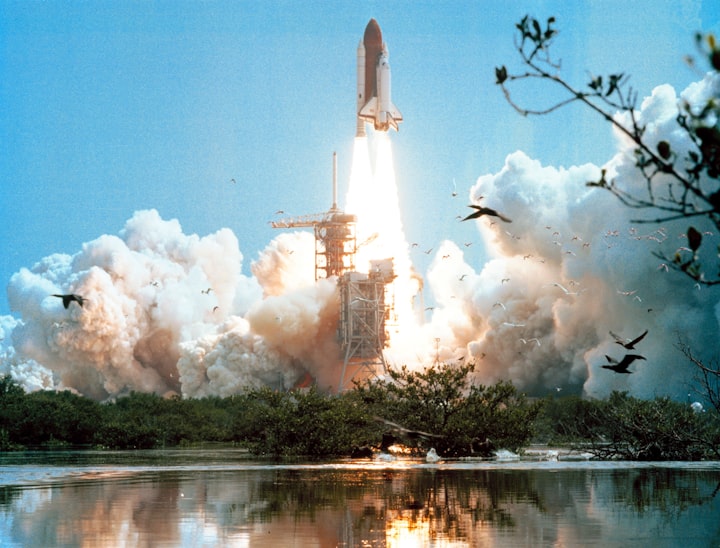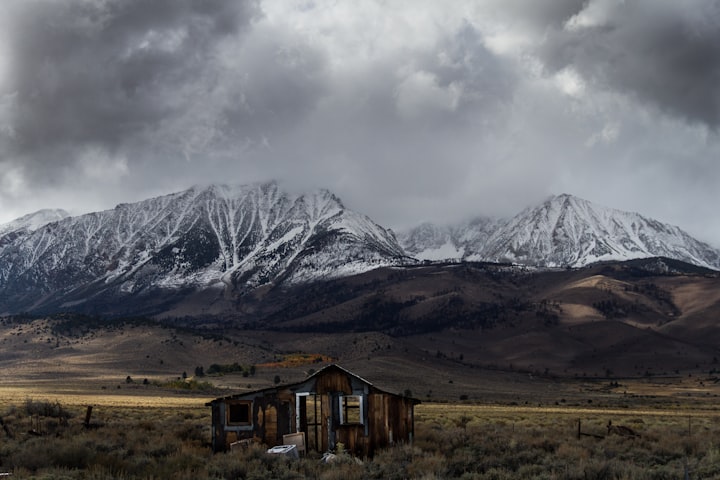Outside Mission Parameters
"Go at throttle up."
Listen to the recorded story on Spotify:
(Available on all major platforms—full list here)
~~~
Sixty seconds after launch, and everything was running smoothly. Michael ran through the checklist for the twelfth time, eyes flicking across the flight control dashboard. Fuel holding steady. Engine temperatures normal. Approaching 60,000 feet.
For the first time, Michael allowed himself a moment to think beyond the immediate demands of piloting the shuttle. It was his first mission into space, and after years of training and waiting, he dared to anticipate the feeling of weightlessness for the first time. Of seeing the Earth from above. Of seeing the stars and the galaxy surrounding the crew.
Then the words of Commander Scobee brought Michael back to the flight deck.
“Go at throttle up,” Scobee transmitted to Mission Control.
Scobee sounded calm, but Michael’s hair stood on end inside his flight suit. Something was wrong. A vibration was jostling the flight deck, distinct from the roar of the shuttle rockets that had been thundering through the crew’s ears and up through their seats for the last seventy seconds.
Michael spoke the first words on his mind. “Uh oh.”
A shockwave ripped through the cabin, and the seat harness dug into his shoulders as his head flew forward.
~~~
When Michael blinked awake, the unusual vibrations had ceased. This would have brought relief, but all vibrations had ceased. Cold sweat crept through his flight gloves.
The flight path of their orbiter had curved. Now they were definitely slowing, and he could feel the orientation of the cabin changing from vertical to horizontal.
But they had not made it into orbit. The sky in front of him had morphed from the brilliant blue it had been on the launchpad in Cape Canaveral to a dark navy, but they were still in the upper stratosphere. The contrast between the top layers of the Earth’s atmosphere and outer space beyond was all the more apparent since the lights inside the flight deck had gone out.
Then Michael saw a solid rocket booster bobbing through the sky in front of them. The rocket that should be attached to the bottom of their orbiter.
The booster was still firing, meaning they had not yet reached the top of their flight path when it would have burned out and disengaged. And they were not weightless.
Now Michael could feel gravity pulling at them as their final bit of airspeed diminished. Like the pendulum at the very edge of its swing, their momentum reached perfect balance for the slightest of heartbeats.
Then the pendulum began its swing in the other direction, and the front of the cabin tipped down.
As their equilibrium shifted, Michael noticed how quiet it was. Something had gone catastrophically wrong if a booster had detached, and yet no alarms were sounding within the flight deck. The darkened lights, the lack of alarms, the lack of any voices from his crew or Mission Control in his headset: it all added up to one conclusion. We’ve lost power.
Of that, there was no doubt. But what about the rocket roaming through the sky on its own? There was at least one scenario that would explain this: We’ve lost the orbiter.
Michael’s heart ceased pumping for a moment. The crew cabin did not break away from the shuttle on its own. As far as the engineers were concerned, it was impossible. But here they were, still alive 60,000 feet above the Earth. As he felt his feet lifting off the floor, he realized they were plummeting through the sky with no contingency plan. “Outside mission parameters,” as those damn flight engineers put it.
Michael turned to the right, waiting for Scobee to chime in with a plan. An observation. Anything. But he found the veteran astronaut slumped over in his seat.
Ahead, the horizon changed to a cloud-speckled ocean. Swiveling his head away from the viewport, Michael looked back at the two mission specialists positioned behind Scobee. Ronald and Judith met his eyes with the whites of their own, their hands clutching the arm rests of their flight seats.
Michael turned back to the viewport. Not like they could do much anyways. They aren’t pilots.
For a moment, he watched the clouds growing closer. They had to be nearing 40,000 feet. A calm started to creep through his chest, a desire to let go. To make his peace.
Not yet, a voice thundered inside his head. I’m the pilot. We’ve trained for years to perform in crises.
The mission specialists couldn’t reach the controls, but he had the entire dashboard in front of him. His mind raced, trying to think through what components could still be helpful in this tiny module of what used to be a shuttle.
I can’t do anything if we don’t have power, Michael decided. His stomach churned, and even after all the hours in the flight simulator, he had to fight against the bile rising in his throat. He fought to control his breathing, to redirect the adrenaline into his movements and his thinking.
Without the shuttle, they had lost their main power generator. But there was an auxiliary to ensure the flight systems remained operable if the orbiter ran into mechanical issues. It had to be triggered manually.
Michael flipped the black covers to reveal the metal switches beneath. He toggled the closest, waiting for a green light to indicate the auxiliary generator was ready to connect to the flight deck circuit. The tiny bulb gave Michael a surge of warmth as it flipped on. At once, the instruments around him revived.
In the same heartbeat, a screech of alarms and warnings filled the cabin. Michael blinked against the fireworks display of flashing lights, fighting to filter through them as they lost more altitude by the moment. Two caught his attention on the main flight data panel:
Critical engine failure.
Ground proximity warning.
For crucial seconds, he wrestled with what to do next. The shuttle had glide capabilities, but the blinking master alarm and a host of other alerts confirmed what he had concluded before: Challenger had broken up. No independent systems existed for the command module that could affect their current trajectory. They didn’t have ejection systems to evacuate the crew if the shuttle was lost.
With the negative G force of their fall, they’d be thrown from their seats the moment they released their harnesses and pinned against the back wall of the command module. The odds of them then being able to crawl to the floor of the module, down the ladder to the crew deck, and then out the side egress hatch were almost zero. But it was a moot point. We don’t have any parachutes even if we could make it to the damn hatch.
The churning in his stomach had turned to a maelstrom. This time Michael didn’t need to guess their altitude as he checked the display: 15,000 feet.
After another moment, Michael felt his heartrate slowing. His fingers curled around the auxiliary power switch, and he pulled it to Off. The chorus of alarms faded away.
“We’ve exhausted all countermeasures,” Michael declared.
A final act of defiance and, at the same time, a sigh of acceptance. He removed his fingers from the control panel and relaxed his hands.
Michael turned back to Ronald and Judith. They met his eyes once again, and then the mission specialists took each other’s hand and bowed their heads. Michael nodded, returning his gaze to the front viewport. Inhaling, he focused less on the approaching waves and more on the sunlight shimmering off the crests.
He exhaled and closed his eyes.
“We will never forget them, nor the last time we saw them, this morning, as they prepared for their journey and waved goodbye and ‘slipped the surly bonds of Earth’ to ‘touch the face of God.’”
- President Ronald Reagan commemorating the fallen astronauts of Challenger
“And our efforts were rewarded once overcoming… darkness by forging blazing wings”
- Monument to the Conquerors of Space (translation)
About the Creator
Stephen A. Roddewig
A Bloody Business is now live! More details.
Writing the adventures of Dick Winchester, a modern gangland comedy set just across the river from Washington, D.C.
Proud member of the Horror Writers Association 🐦⬛







Comments (2)
Whew this held my attention 😭
I was in seminary at the time. Grant Speece, a classmate of my soon-to-be-wife's, came into the campus center with a hollow expression to deliver the news.